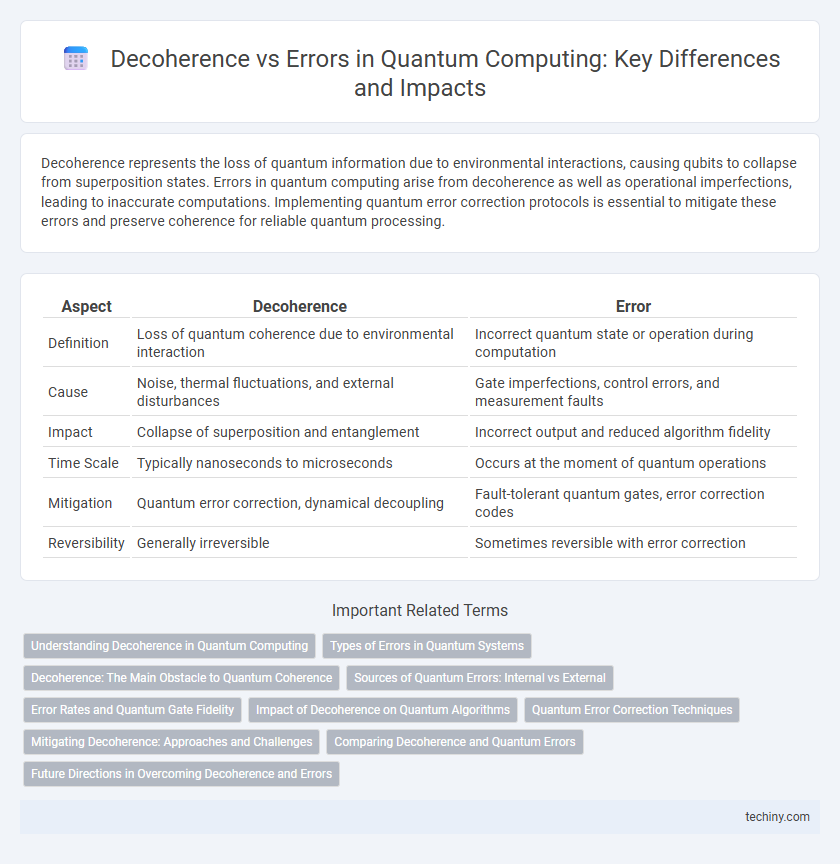Decoherence represents the loss of quantum information due to environmental interactions, causing qubits to collapse from superposition states. Errors in quantum computing arise from decoherence as well as operational imperfections, leading to inaccurate computations. Implementing quantum error correction protocols is essential to mitigate these errors and preserve coherence for reliable quantum processing.
Table of Comparison
| Aspect | Decoherence | Error |
|---|---|---|
| Definition | Loss of quantum coherence due to environmental interaction | Incorrect quantum state or operation during computation |
| Cause | Noise, thermal fluctuations, and external disturbances | Gate imperfections, control errors, and measurement faults |
| Impact | Collapse of superposition and entanglement | Incorrect output and reduced algorithm fidelity |
| Time Scale | Typically nanoseconds to microseconds | Occurs at the moment of quantum operations |
| Mitigation | Quantum error correction, dynamical decoupling | Fault-tolerant quantum gates, error correction codes |
| Reversibility | Generally irreversible | Sometimes reversible with error correction |
Understanding Decoherence in Quantum Computing
Decoherence in quantum computing refers to the loss of quantum coherence when qubits interact with their external environment, leading to the collapse of superposition states and the degradation of information. This phenomenon differs from errors caused by imperfect gate operations, as decoherence arises intrinsically from environmental noise and thermal fluctuations. Understanding and mitigating decoherence is critical for maintaining qubit fidelity and achieving reliable quantum error correction in practical quantum processors.
Types of Errors in Quantum Systems
Quantum systems primarily encounter two types of errors: decoherence-induced errors and operational errors. Decoherence errors arise from unwanted interactions between qubits and their environment, causing loss of quantum information through processes like amplitude damping and phase damping. Operational errors stem from imperfect gate implementations, including over-rotations, under-rotations, and timing inaccuracies, which degrade the fidelity of quantum computations.
Decoherence: The Main Obstacle to Quantum Coherence
Decoherence remains the primary barrier to maintaining quantum coherence by causing quantum systems to lose their superposition states through environmental interactions, leading to the collapse of qubits' wave functions. This phenomenon introduces errors that are fundamentally different from traditional noise, as it destroys the entanglement crucial for quantum computation. Understanding and mitigating decoherence via error correction codes and isolation techniques is essential for advancing scalable and reliable quantum computers.
Sources of Quantum Errors: Internal vs External
Quantum errors arise from both internal and external sources that compromise qubit fidelity and computational accuracy. Internal sources include intrinsic decoherence mechanisms such as energy relaxation (T1) and dephasing (T2), caused by imperfections in qubit materials and control electronics. External sources encompass environmental noise factors like electromagnetic interference, temperature fluctuations, and cosmic radiation, all contributing to qubit state collapse and error accumulation.
Error Rates and Quantum Gate Fidelity
Error rates in quantum computing are primarily influenced by decoherence, which causes qubits to lose their quantum state due to environmental interactions. Quantum gate fidelity measures the accuracy of quantum gate operations, directly correlating to how effectively a quantum computer performs its algorithms. Minimizing decoherence increases gate fidelity, reducing error rates and enhancing overall quantum computational reliability.
Impact of Decoherence on Quantum Algorithms
Decoherence in quantum computing causes the loss of quantum information due to unintended interaction with the environment, severely limiting the coherence time and fidelity of qubits. This degradation directly impacts quantum algorithms by increasing error rates, reducing computational accuracy, and shortening the execution time before results become unreliable. Effective error correction protocols and noise-resistant algorithm designs are essential to mitigate decoherence effects and unlock practical quantum advantage.
Quantum Error Correction Techniques
Quantum decoherence disrupts qubit superposition by entangling quantum states with the environment, causing information loss and computational errors. Quantum error correction techniques, such as the surface code and stabilizer codes, protect qubits by encoding logical qubits into entangled physical qubits to detect and correct errors without measuring the quantum state directly. These methods are critical for maintaining coherence and enabling scalable, fault-tolerant quantum computing.
Mitigating Decoherence: Approaches and Challenges
Mitigating decoherence in quantum computing involves isolating qubits from environmental noise using quantum error correction codes, dynamical decoupling, and topological qubits. Techniques like surface codes and cat states enhance fault tolerance by preserving quantum coherence despite operational errors. Overcoming hardware limitations and maintaining qubit stability over longer timescales remain significant challenges in achieving scalable quantum processors.
Comparing Decoherence and Quantum Errors
Decoherence in quantum computing refers to the loss of quantum coherence, where qubits interact with their environment, causing superpositions to degrade and leading to state collapse. Quantum errors encompass a broader category that includes decoherence but also operational faults such as bit-flip, phase-flip, and gate errors arising during quantum operations. Unlike errors that can be corrected by quantum error correction codes, decoherence represents a fundamental challenge requiring isolation and error mitigation techniques to preserve qubit fidelity.
Future Directions in Overcoming Decoherence and Errors
Future directions in overcoming decoherence and errors in quantum computing emphasize the development of advanced quantum error correction codes and fault-tolerant architectures. Researchers are exploring topological qubits and noise-resilient quantum gates to enhance coherence times and reduce error rates. Integration of machine learning techniques for real-time error detection and adaptive error mitigation presents promising pathways to scalable and reliable quantum processors.
decoherence vs error Infographic

 techiny.com
techiny.com